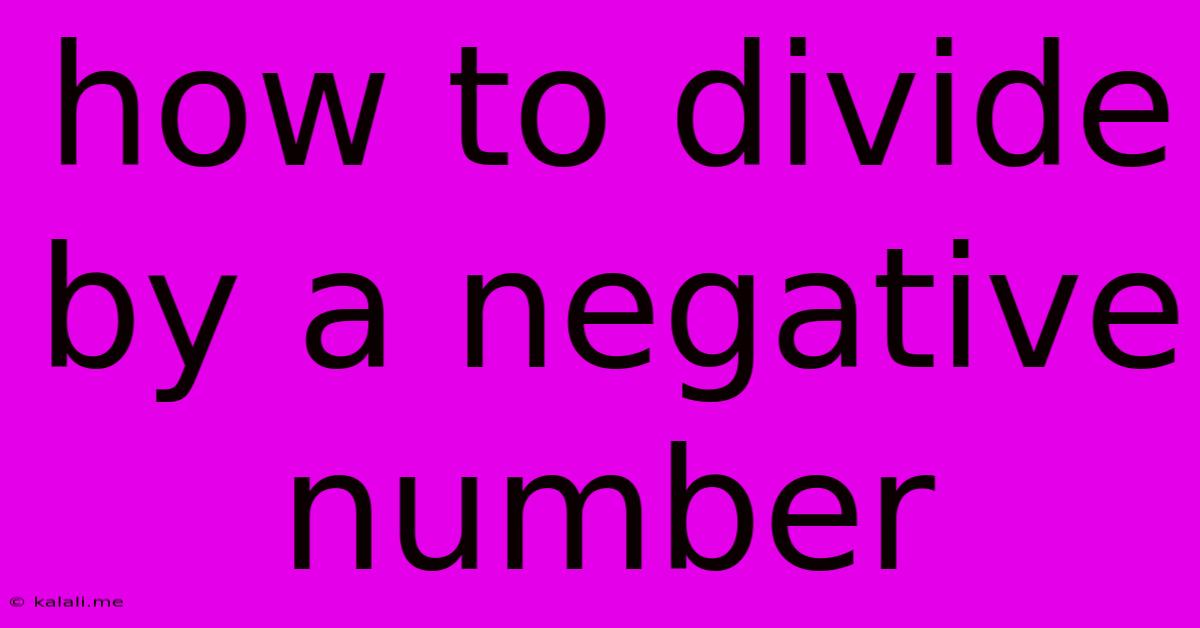How To Divide By A Negative Number
Kalali
May 28, 2025 · 3 min read

Table of Contents
How to Divide by a Negative Number: A Comprehensive Guide
Dividing by a negative number might seem daunting at first, but it's a straightforward process once you understand the underlying rules. This guide will break down how to divide by negative numbers, covering various scenarios and providing helpful tips to master this essential math skill. This guide will help you confidently tackle division problems involving negative numbers, whether you're a student brushing up on your algebra or an adult looking to refresh your math skills.
Understanding the Rules of Signs
The core concept behind dividing by a negative number lies in understanding the rules of signs in arithmetic. These rules govern how positive and negative numbers interact during mathematical operations. Remember these crucial rules:
-
Positive ÷ Positive = Positive: A positive number divided by another positive number always results in a positive number. For example, 10 ÷ 2 = 5.
-
Negative ÷ Negative = Positive: This is where things get interesting! When you divide a negative number by another negative number, the result is always positive. For example, -10 ÷ -2 = 5.
-
Positive ÷ Negative = Negative: Dividing a positive number by a negative number always yields a negative result. For example, 10 ÷ -2 = -5.
-
Negative ÷ Positive = Negative: Similarly, dividing a negative number by a positive number will always result in a negative answer. For example, -10 ÷ 2 = -5.
These rules can be easily remembered using the phrase "Same signs, positive answer; different signs, negative answer".
Working with Different Types of Numbers
Let's explore how to apply these rules to various scenarios:
Dividing Whole Numbers and Integers
Dividing whole numbers and integers involving negative numbers follows the same rules as outlined above. Simply apply the appropriate sign rule based on whether the numbers are positive or negative.
Example:
- -24 ÷ 6 = -4 (Negative ÷ Positive = Negative)
- -36 ÷ -9 = 4 (Negative ÷ Negative = Positive)
- 48 ÷ -8 = -6 (Positive ÷ Negative = Negative)
Dividing Fractions and Decimals
The same principles apply when working with fractions and decimals. Remember to handle the signs separately from the numerical calculation.
Example:
- -2.5 ÷ 0.5 = -5 (Negative ÷ Positive = Negative)
- -¾ ÷ -⅓ = 2 ¼ (Negative ÷ Negative = Positive; remember fraction division rules!)
Dividing Variables and Algebraic Expressions
When dealing with variables, treat the negative sign as part of the coefficient. Follow the same sign rules and simplify the expression algebraically.
Example:
- -6x ÷ 2 = -3x (Negative ÷ Positive = Negative)
- -12y ÷ -3y = 4 (Negative ÷ Negative = Positive; The 'y' cancels out)
Tips and Tricks for Success
-
Keep Track of Signs: Carefully note the signs of each number before performing the division. This is the most common source of errors.
-
Break Down Complex Problems: If you're facing a complex division problem with multiple negative numbers, break it down into smaller, simpler steps.
-
Use a Calculator (Wisely): A calculator can be a helpful tool, especially for complex calculations. However, it's crucial to understand the underlying principles to avoid relying on the calculator blindly.
-
Practice Regularly: The key to mastering division with negative numbers is consistent practice. The more you practice, the more comfortable you'll become.
By understanding the rules of signs and following these tips, you'll be well-equipped to handle any division problem involving negative numbers with confidence. Remember, consistent practice is key to mastery!
Latest Posts
Latest Posts
-
Sql Update Table With Data From Another Table
May 29, 2025
-
How Do I Get A Dog To Stop Digging
May 29, 2025
-
How Many Enchantments Can A Bow Have
May 29, 2025
-
Can You Convert A 120v Outlet To 240v
May 29, 2025
-
What To Do At Work When There Is No Work
May 29, 2025
Related Post
Thank you for visiting our website which covers about How To Divide By A Negative Number . We hope the information provided has been useful to you. Feel free to contact us if you have any questions or need further assistance. See you next time and don't miss to bookmark.